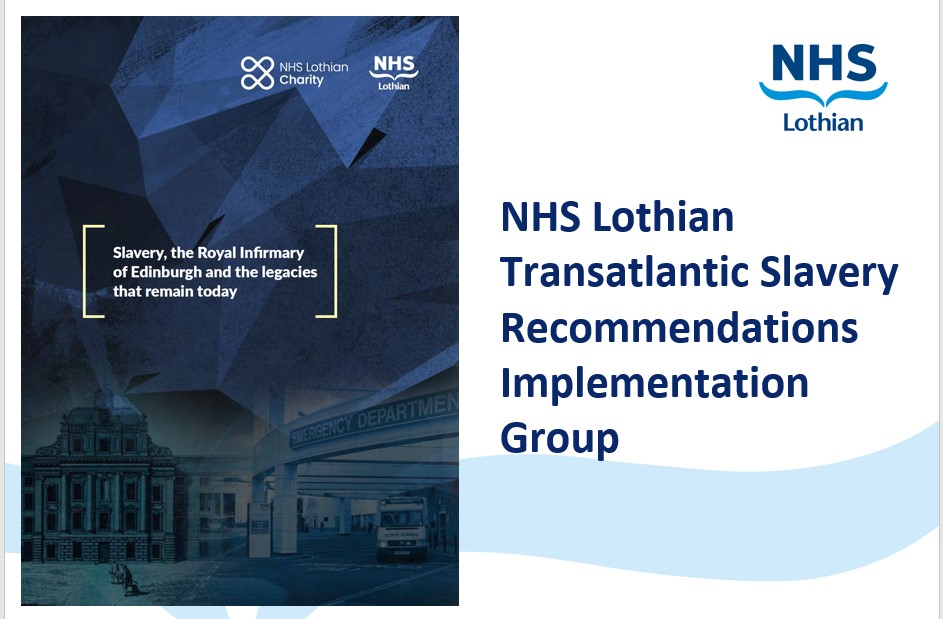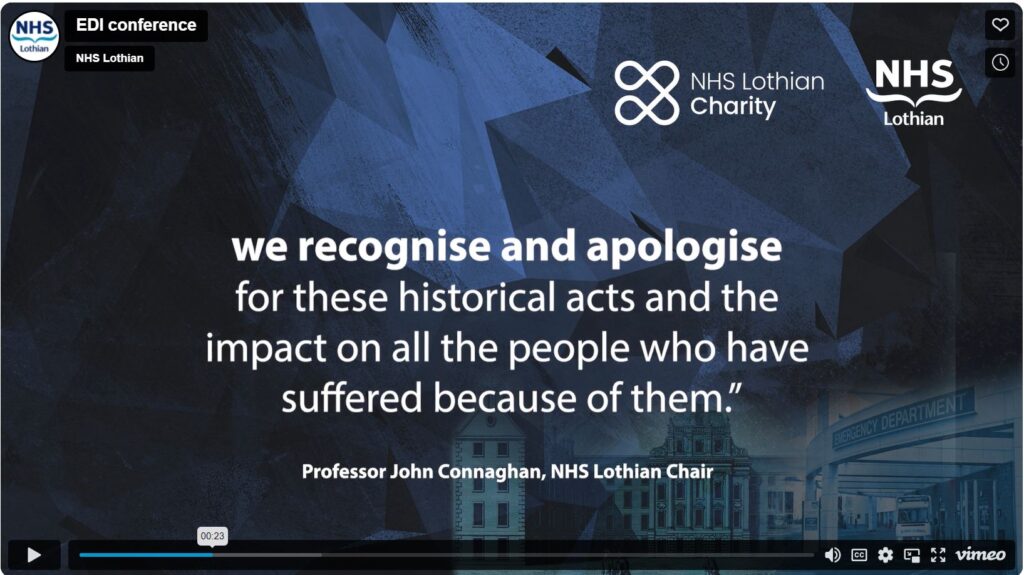In 2023, the NHS Lothian Board agreed to take action after research revealed the Royal Infirmary of Edinburgh has historical links to slavery.
As a healthcare provider and employer NHS Lothian has a duty to stop racism, inequality and discrimination. In 2021 NHS Lothian Charity funded a project to look into the links the Royal Infirmary of Edinburgh had with Atlantic slavery and the legacies of this today.
The ‘legacies’ of slavery can mean many things. The actions taken in Scotland by enslavers or those with financial ties to Atlantic slavery helped to create many key features of life today e.g. corporations, roads, schools, universities and hospitals. The most immediate legacies were for enslaved people and their descendants. Atlantic slavery was central to the underdevelopment of both Africa and the Caribbean and established and sustained racist ideas about Black people which still influence the world we live in today, including inequalities in health.
NEW – Recruiting for NHS Lothian Transatlantic Slavery Recommendations Implementation Group (TASRIG)
NHS Lothian are looking for 15-25 people to join the Transatlantic Slavery Recommendations Implementation Group to help continue to take this work forward.
We are looking for a mix of NHS Lothian staff, service users and community members to work alongside our three co-chairs. Information about work of the Group, the Co-Chairs and the knowledge, skills, experience and interests that the Group is looking for is included in the recruitment pack available to download here.
The recruitment process opened on 25 August 2025 and will close on 25 September 2025.

Public acknowledgement and apology
Speaking at the NHS Lothian Equality and Diversity Conference on 28 February 2024, NHS Lothian Chairman, Professor John Connaghan CBE, said:
“Since the founding of the Royal Infirmary of Edinburgh in 1729 and as Scotland’s oldest voluntary hospital the Royal has a long and distinguished history due in the main to the dedicated staff who have built its reputation over the years.
“However, as an institution dedicated to the care of individuals and with core values of compassion, honesty and integrity NHS Lothian needs to face up to and apologise for the fact that in the early days of this great hospital, wealth to support its activities was drawn from the practice of slavery that we now know was a crime against humanity.
“As we near our third century we recognise and apologise for these historical acts and the impact on all the people who have suffered because of them.
“The knowledge and understanding we have gained from examining the history of the Royal in more depth has reinforced our determination to ensure NHS Lothian is an organisation where all people feel welcome, as staff, patients and visitors and where we strive to achieve equal access to healthcare for all.”
Chair of the Edinburgh Slavery and Colonialism Legacy Review Implementation Group, Irene Mosota, said:
“We welcome the fact that NHS Lothian have committed to anti-racism as an organisation. Alongside the research into the Royal Infirmary of Edinburgh’s historical links with slavery and colonialism this represents a positive step in the right direction. I hope these measures will ensure that NHS Lothian is an organisation where all patients and colleagues are respected, accepted and supported.
“It’s right that as a city we are examining and working through our historical links with slavery and colonialism and what this means in the modern day. We will not shy away from this work.
“I’d encourage other organisations in Edinburgh and beyond to follow NHS Lothian’s example and commit to anti-racism as a central aim.”
Watch this short video for some reflections given during the conference from Professor John Connaghan, Irene Mosota, Calum Campbell (NHS Lothian Chief Executive) and Professor Sir Geoff Palmer (Chancellor of Heriot-Watt University).

Official Report
We published an official report – Slavery, the Royal Infirmary of Edinburgh and the legacies that remain today. If you need a copy of the official report in an alternative format or language please contact our switchboard on 0131 242 1000 or email us on loth.equalityandhumanrights@nhs.scot

Research Project
The research confirmed that some people who donated money to the hospital in the eighteenth and nineteenth centuries were enslavers or benefitted financially from enslavement.
The research also showed that the hospital made money from renting out an estate, and the enslaved people who lived there, in Jamaica called Red Hill pen. The estate was left to the hospital in the will of a Scottish surgeon in 1750 and the hospital owned and rented out this estate and the enslaved people (and, after the abolition of slavery, ‘apprentice’ labourers) for over 143 years.
The hospital received what would be equivalent to around £39 million from these donations and the income from Red Hill pen and used the money to pay for doctors, fund a new hospital building and buy medicines.
We recorded the findings in a public research report – Uncovering Origins of Hospital Philanthropy: Report on Slavery and the Royal Infirmary of Edinburgh (PDF).

Public Conversations
We ran ‘conversation events’ with nearly 200 people to help us understand the research and how it relates to life today. Six themes emerged from these events – acknowledgment and apology, commemoration, education, further research, reform and partnerships.
We recorded the results in a public consultation report (PDF).
Learning from others
We commissioned expert advice and learned from other organisations taking steps to acknowledge their connections with slavery including the City of Edinburgh Council, Museums and Galleries Scotland and University of Glasgow.
Recommendations and Actions
The NHS Lothian Board agreed to seven recommendations to understand and acknowledge this part of its past and take action to stop modern day racism and discrimination and contribute towards improvements in health and work outcomes for the people we serve and employ.
- Publicly acknowledge and apologise
We will issue a public apology and acknowledgement that the history of the Royal Infirmary of Edinburgh and the wider history of Atlantic slavery explains much about racism and why Scotland looks how it does today. - Establish an Implementation Group and Chair
We will establish a group to advise on and steer the delivery of the recommendations. The group will include representatives from NHS Lothian Board, the BME staff network and the local community. - Tackle racial inequalities in employment and health
We will ensure we have a diverse and inclusive workforce with staff who challenge racism. We will learn from experts, including people with lived experience to understand the impact of discrimination and other factors on racial health inequalities and take action. - Commission commemorative works and review current arts and culture activities
We will install a commemorative plaque at the Royal Infirmary of Edinburgh, respecting the people who suffered the horrors of Atlantic slavery. We will review our artwork and if there is a link to slavery we will add information about this. We will commission new artwork to represent people who fought against Atlantic slavery and that represents our diverse communities. - Educate people about our history and legacies of slavery
The hospital’s connections with slavery will be included in training for all NHS Lothian staff and shared with local groups. This will empower staff to develop an understanding of their own values, beliefs, and cultures and those of other staff and patients. It will help staff understand and challenge racism. - Partner with Jamaica and West African countries
We will explore how to work in partnership with health centres, hospitals and centres for medical research in Jamaica and West Africa for the benefit of people living there and in Scotland. We will follow the Scottish Code of Practice for International Recruitment of Health and Social Care Personal and respect the need to protect the healthcare systems of lower income countries. - Undertake further research
We will do more research into the connections between other NHS Lothian hospitals and slavery and into the lives of the enslaved women on Red Hill pen. We will explore partnerships to allow further research on medicine, slavery and colonialism, and the impact of British medicine on enslavement.

Do other organisations have similar connections to slavery?
Yes. Like elsewhere in Britain, across Scotland slavery-associated wealth was embedded into the country’s economy and landscape. University College London’s Legacies of British Slavery Database, and the Slave Voyages Consortium’s Trans-Atlantic Slave Trade Database, amongst other sources, help us to understand the scale of Britain’s connections to slavery.
Many other organisations are investigating their connections to slavery. Some examples include:
City of Edinburgh Council Link to Edinburgh Slavery and Colonialism Legacy Review
George Watson College Link to The Legacy of George Watson
Glasgow City Council Link to Glasgow’s Slavery Legacy
University of Glasgow Link to Historical Slavery Initiative
Guy’s and St Thomas’ NHS Foundation Trust Link to Thomas Guy, Sir Robert Clayton and Our Shared Colonial Past: Sources, Context, Connections














